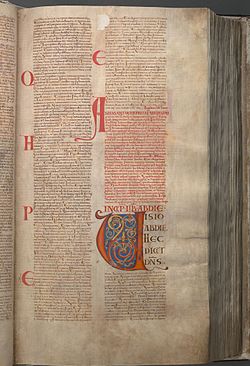| Amos 6 | |
|---|---|
 | |
| Book | Book of Amos |
| Category | Nevi'im |
| Christian Bible part | Old Testament |
| Order in the Christian part | 30 |
Amos 6 is the sixth chapter of the Book of Amos in the Hebrew Bible or the Old Testament of the Christian Bible.[1][2] In the Hebrew Bible it is a part of the Book of the Twelve Minor Prophets.[3][4] This book contains the prophecies attributed to the prophet Amos. The Jamieson-Fausset-Brown Bible Commentary summarises this chapter as
[a] denunciation of both the sister nations[a] (especially their nobles) for wanton security — Zion, as well as Samaria: threat of the exile: ruin of their palaces and slaughter of the people: their perverse injustice.[5]
Whereas chapter 5 condemns the conduct of worship in Israel without justice, in chapter 6 "we are taken from the public worship of the people to the private banquets of the rich, but ... only in order to have their security and extravagance contrasted with the pestilence, the war, and the captivity that are rapidly approaching".[6]
The original text was written in Hebrew. This chapter is divided into 14 verses. Some early manuscripts containing the text of this chapter in Hebrew are of the Masoretic Text tradition, which includes the Codex Cairensis (895), the Petersburg Codex of the Prophets (916), Aleppo Codex (10th century), Codex Leningradensis (1008).[7]
Fragments containing parts of this chapter were found among the Dead Sea Scrolls including 4Q78 (4QXIIc; 75–50 BCE) with extant verses 13–14;[8][9][10] and 4Q82 (4QXIIg; 25 BCE) with extant verses 1–4, 6–14.[9][11][12]
There is also a translation into Koine Greek known as the Septuagint, made in the last few centuries BCE. Extant ancient manuscripts of the Septuagint version include Codex Vaticanus (B; B; 4th century), Codex Alexandrinus (A; A; 5th century) and Codex Marchalianus (Q; Q; 6th century).[13][b]
Biblical translator Jerome interprets "the great house" as Israel and "the small house" as Judah.[5]